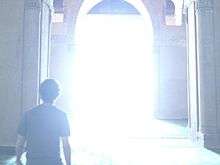Barzakh
| Part of a series on |
| Islam |
|---|
 |
|
Related topics |
|
| Part of a series on |
| Eschatology |
|---|
|
|

Barzakh (Arabic: برزخ From Persian برزخ (barzax)) is an Arabic word meaning "obstacle", "hindrance", "separation",[1] or "barrier".[2] In Islamic eschatology, although largely up to interpretation, al-Barzakh is generally viewed as the barrier between the physical and spiritual worlds, in which the soul awaits after death and before resurrection on Qiyamah (Judgement Day).
Sources in Qur'an and hadith
Barzakh is mentioned only three times in the Qur'an, and just once specifically as the barrier between the corporeal and ethereal, as a place in which, after death, the spirit is separate from the body, freed to contemplate the wrongdoings of its former life. Despite the gain of recognizance, it cannot utilize action.[3] The other two occurrences refer to Barzakh as an impassable barrier between fresh and salt water.[4][5] While fresh and salt water may intermingle, an ocean remains distinct from a river. Pertaining to Al-Barzakh, this notion implies that although the physical and spiritual realms are distinctly separate, transmigration through Al-Barzakh between the two is possible, as later expanded by Sufi mystics.
In Hadith, Ibn al-Qayyim cites that, albeit not mentioned in the Qur'an, souls in Al-Barzakh would be grouped with others matching in purity or impurity.[6]
Significance of body and soul separation
In Islam, the soul and the body are dependent upon each other. This is significant in Barzakh, because only a person's soul goes to Barzakh and not their physical bodies.[7] Since one's soul is divorced from their body in Barzakh, the belief is that no progress or improvements to one's past life can be made.[7] If a person experienced a life of sin and worldly pleasures, one cannot try to perform good deeds in order to reach Jannah. Whatever one does in his or her lifetime is final and cannot be changed or altered in Barzakh.
Barzakh and Christian purgatory
The idea of purgatory is that it is a place where people go after death that holds punishment and purification for those who are not fit to enter Paradise just yet. People who are in this place do not have enough sins to warrant their entrance into Hell, but they do not have enough good deeds to go to Paradise. This is a temporary place, similar to barzakh.[8] Because they have this in common, some believe that they are the same idea or concept.[9] Barzakh is actually closer to the idea of limbo, a place that is between life and the true afterlife.[9] In this place, people await their final judgment, much like in barzakh. The Quranic idea of aʿrāf or “heights” is closer to that of Christian purgatory. Aʿrāf is also thought of as a place where souls go whose good and bad deeds are too evenly matched to go directly to Paradise or the Fire.[8]
Interpretations
Mainstream discourse
Some Muslim scholars stress the importance of Barzakh, while others simply look past its existence.
- Modern Muslim thinkers de-emphasize Barzakh, and focus instead on a person's individual life and the Day of Judgment. In this view, the state of Barzakh is simply looked past and skipped once a person dies.[10]
- Muslim scholars who do believe in Barzakh still have varying interpretations of this intermediate state based on different traditions. Some traditions suggest that a person's deeds in their life will affect their experience in Barzakh. In these traditions, there are two states of Barzakh. In the state known as "Azhlaabul-Qabr," a person will be punished for his or her deeds in their past life.[11] In the other state known as "Tan'eemu Ahlit-Taa'ah Fil Qabr," a person will receive the blessings and bounties of Allah because of his or her faith and good deeds.[11] Other traditions suggest that people in Barzakh are given temporary bodies. In this view, a person is either given a bright body or a dark body. These bodies are believed to be prepared from either the light or darkness of their deeds.[7] If a person is given a bright body then this indicates that a person will go to heaven, while a dark body represents hell.[7] In these traditions, Muslim scholars believe that once a person is given their body in Barzakh, they will already know their fate for the Day of Judgment. It is worth noting that in these traditions where Muslim scholars believe in Barzakh, they are basically saying that a person will be familiar with his or her fate prior to the Day of Judgment. This is based on what a person experiences in this intermediate state.
- Al-Ghazālī states, "After the First Blast, all created beings shall abide for forty (it is unknown if it is a year or month or etc.) in the Intermediate Realm [barzakh]. Then shall God quicken Seraphiel, and command him to deliver the Second Blast, as He has said (Exalted is He!): Then shall it be blown again, and lo! they stand, beholding : they shall be on their feet, watching the Resurrection." [12]
- Al-Zamakhshari explains Barzakh to mean hā'il, "an obstacle." His adaptation of the meaning of the word coincides with Barzakh meantionings in Qur'an literature: 25:53.
- Abdullah Yusuf Ali referred to a Barzakh state as a "quiescent state." The soul lies in a resting state until Yawm al-Qiyāmah.
Sufism
In Sufism, the Barzakh or Alam-e-Araf, is not only where the human soul resides after death but it is also a place that the soul can visit during sleep and meditation. Major Scholar, Ibn 'Arabi, defines Barzakh as the intermediate realm or "isthmus". It is between the World of Corporeal Bodies and the World of Spirits, and is a means of contact between the two worlds. Without it, there would be no contact between the two and both would cease to exist. It is described as simple and luminous, like the World of Spirits, but also able to take on many different forms just like the World of Corporeal Bodies can. In broader terms Barzakh, “is anything that separates two things”. It has been described as the dream world in which the dreamer is in both life and death.[13] Barzakh can also refer to a person. Chronologically between Jesus and Mohammad is the contested Prophet Khalid. Ibn 'Arabi considers this man to be a “Barzakh” or the Perfect Human Being. Chittick explains that the Perfect Human acts as the Barzakh or "isthmus" between God and the world.[14] Ibn 'Arabi's story of Prophet Khalid is a story of Perfect Human being.
Khalid's story is of a Prophet whose message never emerged because before he died, he told his sons to open his tomb forty days after his death to receive the message of Barzakh. The sons, however, feared they would be looked down upon for opening their dead father's tomb, therefore they decided not to exhume their father. Thus, his message was never shared. An Ottoman Scholar explained that for Khalid to give the knowledge of Barzakh he would have to travel through the different worlds and then return, but because he was not exhumed, his message was never heard. Ibn 'Arabi explains that because this mission ended in failure, it does not conflict with The Prophet Mohammed’s statement: “ am nearest of men to Jesus son of Mary, for there is no prophet between him and me.”[13]
Shia
The idea of Barzakh in Shia is significant though in a perspective and manner different from Sufism. The Prophet and Shia Imams, particularly the 6th Imam - Imam Jafar As-Sadiq, have explained through various hadiths the treatment, condition, processes, and other intricate details regarding the passage of Barzakh.[15] In Shia theology, there are 7 checkpoints in Barzakh.[16] The first being kindness/trust/wilayah. Second is salaat. Third is zakaat/khums. Fourth is fasting. Fifth is hajj. Sixth is cleanliness. Seventh is rights. It is believed that the terms and conditions to understand Barzakh are limited in scope and full comprehension because it is Shia's belief that it is incomprehensible, to a certain degree, until one actually reaches the realm beyond our physical world. A common analogy used is that of a baby in the womb. Just as the baby cannot possibly begin to understand the vast outside world until they experience it for themselves, we cannot hope to understand what Barzakh entails until we transition there ourselves. Though despite this obstacle, the Shia Imams, as cited through various sayings, have explained Barzakh to a significant degree as compared to other sects within[17] Islam.
Contemporary interpretations and uses
The term has also found its way into more contemporary, non-religious sectors of life. At least three bands have adopted the name Barzakh, including an Indonesian Jakarta black metal band, a Tunisian Oriental metal band and Naqash Ali Shawkat band. Additionally, Barzakh was used as the title of a 2011 documentary following citizens of a war-torn Chechan community searching for a lost friend who they believe may have transitioned from our physical world to the realm of Barzakh.[18]
See also
References
- ↑ The Encyclopedia of Islam. 1960. pp. 1071–1072.
- ↑ Ali, Abdullah Yusuf. The Qu'ran. Elmhurst, NY. Sur 23: 99-100: Tahrike Tarsile Qu'ran, Inc.
- ↑ Ali, Abdullah Yusuf. The Qur'an. Elmhurst, NY. Sur 23: 99-100: Tahrike Tarsile Qur'an, Inc.
- ↑ Ali, Abdullah Yusuf. The Qur'an. Elmhurst, NY. Sur 25: 53: Tahrike Tarsile Qur'an, Inc.
- ↑ Ali, Abdullah Yusuf. The Qur'an. Elmhurst, NY. Sur 55: 19-20: Tahrike Tarsile Qur'an, Inc.
- ↑ al-Qayyim, Ibn. "Section 63. Burial". Fiqh-us Sunnah.
- 1 2 3 4 Khan, Sir Muhammad (December 2011). "The Philosophy of the Teachings of Islam- Part12". The Review of Religions.
- 1 2 Smith, Jane I. "Afterlife: An Overview". Encyclopedia of Religion. GaleGroup Online. Retrieved 5 December 2012.
- 1 2 Qader, Nasrin (Fall 2002). "Fictional Testimonies or Testimonial Fictions: Moussa Ould Ebnou's Barzakh". Research in African Literatures. 33 (3): 14–31. doi:10.1353/ral.2002.0088. Retrieved 28 November 2012.
- ↑ "Barzakh, al-". The Oxford Dictionary of Islam.
- 1 2 Islam, Maulana. "Al Barzakh - The Realm After Death in Islam". IslamicInformation.net. Retrieved June 24, 2008.
- ↑ Ghazali, Al- (1989). The Remembrance of Death and the Afterlife. The Islamic Text Society. p. 176.
- 1 2 Ibn Al-Arabi, Muhyiddin (2006). Angela Jaffray, ed. The Universal Tree and The Four Birds. Anqa Publishing. pp. 29n,50n, 59, 64–8, 73, 75–8, 82, 102.
- ↑ Chittick, William C. (1979). "The Perfect Man as the Prototype of the Self in the Sufism of Jāmi". Studia Islamica. Maisonneuve & Larose (49): 135–157.
- ↑ Ayatullah Shaheed Sayyid Abdul Husain Dastghaib. "Barzakh is the Veil of this World". Retrieved 7 December 2012.
- ↑ Shirazie, Ayatullah Sayyid Abdul Husayn Dastghaib. "The Hereafter". Al-Islam.org. Ansariyan Publications. Retrieved 26 January 2015.
- ↑ Qummi, Sheikh Abbas. "MANAZELUL AKHERAH" (PDF). ziyaraat.net. Madinatul Ilm Islamic Centre. Retrieved 26 January 2015.
- ↑ "Barzakh". Retrieved 7 December 2012.

